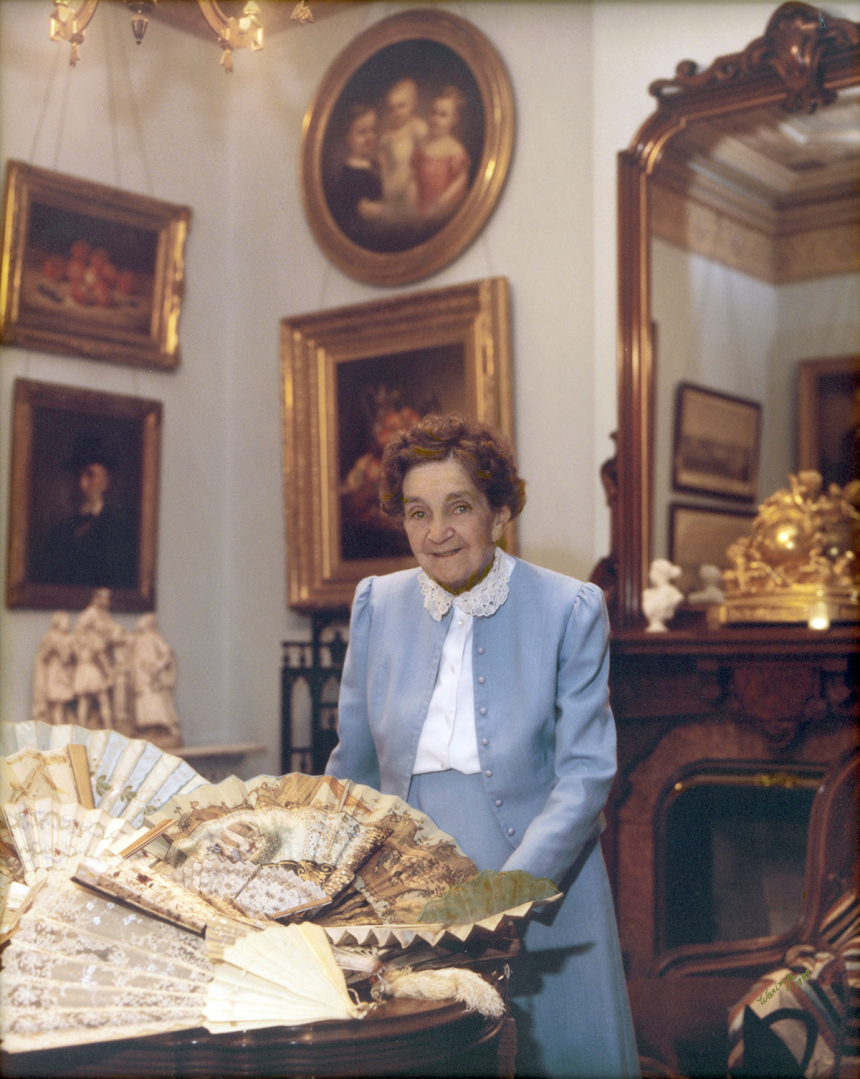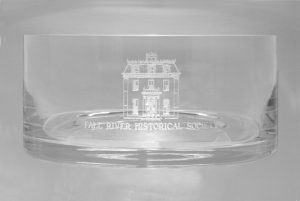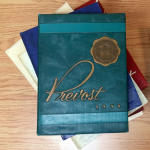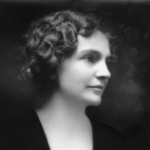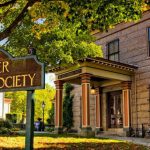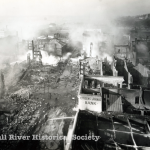On the evening of Thursday, October 4th, the FRHS hosts the third annual Florence Cook Brigham Award dinner – a fine event – named in honor of our beloved third curator, noted Fall River historian and a “decidedly reluctant authority on … Lizzie A. Borden,” who died in 2000 at the age of 100.
The age of one hundred years and twenty days, to be exact.
Hard to believe that over eighteen years have passed since her death.
What can I say about Mrs. Brigham?
She was the greatest of ladies, was my dearest friend and mentor, and not a day goes by that I do not think of her in some way.
Her impact on my life – my pen is not adequate to the task of expressing that.
The Brigham Award is presented to worthy individuals – usually two but this year we have three – who are members of the FRHS and have made significant contributions to the museum or the greater Fall River community in areas of historic preservation, the arts, published historical works, and/or volunteerism.
This year’s recipients: Cathy Kitchen, for her outstanding service to the FRHS over several decades; Bob Kitchen, for his exceptional work on behalf of the FRHS and promoting the history of the city through educational lectures and online exhibits; and Al Lima, for his tireless efforts in documenting the history of Fall River, historic preservation, and environmental conservation.
Mrs. Brigham knew all three of the honorees, and I know that she would be pleased.
In honor of Mrs. B., I thought it fitting to offer up a few personal reminiscences that I delivered at the first awards ceremony in 2016 – brief, to be sure, but sincere in the telling.
In addition is a biographical profile about her – a fascinating life – originally written for the awards program; I hope it gives the reader a brief glimpse into the life of this very special lady.
Anyone who did not know her: I wish that you had the privilege, because a privilege it was.
An aside of interest, perhaps, to some readers:
After years of prodding, Mrs. Brigham finally relented and wrote her reminiscences – a lovely tale, filled with anecdotes, it sounds just like her. There were four copies, privately compiled and presented at Christmas: One to each of her three children, and one for me.
On mine is a note, written in her diminutive vertical scrawl – challenging for the uninitiated – and placed there by Mrs. B. just before she gave it to me:
“Not to be quoted from until I am gone. F.C.B.”
Classic Mrs. Brigham.
So now, nearly two decades after her passing, I am revisiting it, rounding it out a bit here and there, and adding a more in-depth narration, simply by way of explanation – done in a post script sort of manner, her voice will be preserved, as in the original document.
The intent?
To one day publish it.
Someday.
But not yet.
The following tribute to Florence Cook Brigham was delivered at the Awards Ceremony in 2016:
Many years ago, I promised Florence Cook Brigham that I would never eulogize her in any way, and in the sixteen years since her death, I have kept that vow, and I have no intention of breaking it now. So what I say will be brief, but no less heartfelt.
In the summer of 1978 a thirteen-year-old boy met a seventy-eight year old woman, and for reasons unknown to me, but for which I have always been grateful, we immediately connected. Little did I know it at the time, but the course of the greater portion of my life had been set, with its path directed by this diminutive powerhouse of a woman who had been at the Fall River Historical Society since 1967 and was recognized as the city’s leading historian.
In many ways, my early days at the Historical Society can best be likened to one entering a time-warp, or perhaps Alice and her Looking Glass. I say this, because in those days, the Historical Society was a place still very much governed by the social mores of another age. Things were done in the manner in which they always had been done; no one could explain why, though it was never questioned and accepted as matter of fact. In the late 1970s, coal was still burned in the office fireplace for heat; tea was habitually served in the afternoon; and one was dissuaded from using contractions because Miss Elizabeth Carr, the daughter of an old, much-esteemed Fall River family and a frequenter of the Historical Society, considered them vulgar.
I realize now, looking back after many years, that for some individuals the Historical Society was a sanctuary of sorts — it was as if the financial reversals that had so severely affected the city of Fall River and many of its old guard had never occurred; time stood still, and the old ways still accounted for something.
It is often said that one does not easily forget the teachings of childhood, and I know this to be true. To this day, despite many significant changes, some things at the Historical Society are still done the way they always have been: The mid-19th century Japanese cloisonné temple vase in the parlor is positioned with the green dragon facing out, because Hope Gordon (Thatcher) McIntyre always liked it that way; clocks are wound on Tuesday; silence cloths are always laid under tablecloths; and almond macaroons, baked to Caroline Elizabeth (Slade) Brayton’s original recipe, are served at every membership meeting, just as they have been since 1921.
Mrs. Brigham was an intensely private woman, and shunned any form of personal recognition, and believe me when I say that it would have taken considerable persuading on my part to convince her to agree to an award named in her honor, however fitting. But I know, or at least I like to think, that she would have come around, eventually, and given in to the person she always called “my Michael.”
During the over two decades we spent together, much of it on a daily basis, I can say in absolute sincerity that not a single disagreement passed between us. If it be true that some people are charmed at birth, then, without doubt, my dear Mrs. Brigham fell into that category.
She was my greatest friend and mentor, and not a single day passes that I do not think of her in some way, be it when I hear an expression she often uttered or particularly liked, or pass something in my home that was once hers. The memory may be triggered by the sight of a particularly “gooey” pastry — she could never resist them — or a sugar cube, which she devoured in quantity “for energy,” or an over ripe banana, a cup of weak tea, or even the smell of gasoline, a foul scent to many, but one that she found particularly pleasant.
It was a privilege to know her, and I owe her more than I can say, though it is a debt she would neither acknowledge, nor ever claim.
Perhaps Mrs. Brigham’s greatest nemesis, and the only one that to my knowledge she never conquered, was the genusTaraxacum of the Asteraceae family, commonly known as the dandelion. She despised them. Every day, during the long growing season, she persistently walked the Historical Society grounds, just as she did at home, bag in hand, deadheading the little pests — and when I came on the scene, I was enthusiastically invited, in point of fact, encouraged, to join in. The purpose of this fruitless task stemmed from Mrs. B’s wonderfully naive belief that plucking the florets would prevent their going to seed, thus eradicating the problem. It apparently never occurred to her that seed constantly blew in on the wind, thus firmly embedding their rapidly developing taproots in the soil; if it did occur to her, it was not mentioned, at least never in my presence. It became somewhat of a game to see who would pick the largest quantity, and, despite persistent deadheading, there were plenty to be had.
And so, for nearly two decades, we plucked dandelions, with little effect.
One day, by which time Mrs. B. was well into her nineties, we headed out to our habitual harvest. After picking a few, Mrs. B. stood up, planted her hands on her hips and said, “Michael, let’s forget this. They have got the best of me,” and with that, she headed back in.
Finis.
I knew then what I had suspected for some time; Mrs. B. was failing. I can best liken the sentiment that came over me to a barb, tied with a bouquet of bright yellow dandelions, accurately hitting home, with me being its mark.
For some time afterward, unbeknownst to Mrs. B., I still deadheaded the dandelions so she would not have to see them.
And to this day, I still do.
Michael Martins
Curator
Fall River Historical Society
October 13, 2016
About Florence Cook Brigham (1899-2000)
 Florence Cook Brigham was born in Fall River, Massachusetts, on December 31, 1899, the daughter of Benjamin Cook (1870-1962), a successful attorney and, later, jurist, and the Brooklyn, New York, born Hattie May Clark (1873-1963), a minister’s daughter. During her long life, she bore witness to her native city’s rapidly changing fortunes, and experienced, first hand, the major events in Fall River’s twentieth-century history. In her later life, those observations would serve her well; she knew Fall River history, because she had lived it.
Florence Cook Brigham was born in Fall River, Massachusetts, on December 31, 1899, the daughter of Benjamin Cook (1870-1962), a successful attorney and, later, jurist, and the Brooklyn, New York, born Hattie May Clark (1873-1963), a minister’s daughter. During her long life, she bore witness to her native city’s rapidly changing fortunes, and experienced, first hand, the major events in Fall River’s twentieth-century history. In her later life, those observations would serve her well; she knew Fall River history, because she had lived it.
An astute, inquisitive child with a keen memory, she was reared by loving parents in the late Victorian manner with a strong sense of duty and responsibility to family, church, and community. “I had a lovely childhood,” she later stated, writing, “I can remember my mother … saying that my father had only one extravagance and that was his three daughters.” But the Cook girls, at times, must have been a handful: “We must have been very hard to take care of, since we went through fifteen nursemaids” before finding “our sixteenth,” who stayed.
Educated in the public schools of her native city, she graduated from B.M.C. Durfee High School with the class of 1917; the narrative printed below her photograph in The Durfee Record emphasized qualities that would be a mainstay throughout her long life:
“A quiet, studious girl [with] a host of friends … the delight of her teachers. Good nature is one of her characteristics and she may often be seen generously devoting [time] to [those] who desire help.”
Following high school, she entered Mount Holyoke College, where she majored in German, with a minor in Romance languages, later recalling, “German was not very popular in those days.” Graduating in 1921, she returned to her parents’ Hood Street residence and secured employment for one year teaching German as a substitute at Durfee High School, a situation she described as “not very successful … discipline was my problem.” She willingly turned her salary over to her parents: “We were never told that we should, but … wanted to work a year to show our appreciation” for providing her with an education. In 1922, she married fellow Fall Riverite Richard Curtis Brigham (1895-1974); they were the parents of three children.
In the traditional mode of her contemporaries during that last halcyon decade of Fall River’s prosperity, her expected role upon marriage was that of homemaker, mother, and clubwoman, a path her life followed until, as she aptly put it, “the Depression took hold.” Without hesitation, Florence entered the workforce, recalling, “most everyone from Fall River was feeling the pinch.”
She sold girls’ clothing door-to-door, from a “company in Davenport, Iowa, with darling dresses that were very reasonable – some for two dollars.” In the summer months, she took boarders, oftentimes the children of friends, at the Brigham family cottage in Craigville, Massachusetts, “for $1.00 per day,” and, despite knowing “nothing about running a counter,” she industriously managed a lunch counter on the beach for The Christian Camp Meeting. The latter “turned out better than expected.”
In 1940, she accepted an offer to “run that year’s Christmas Seal Campaign” for the Anti-Tuberculosis Society. The sale was extremely successful and, “when it was decided to open an office year-round,” she “took over, part-time.” Her days selling girls’ clothing were behind her, a situation, she later wrote, “which didn’t break my heart one bit.”
During World War II, “the Luther Mill had been called into service,” and Mrs. Brigham was asked to go into the office part-time as a payroll clerk: “I knew nothing about payrolls … could I read charts … I should hope I could. I went in and worked both jobs.”
In 1967, she retired, briefly. That same year, she “was asked if she was interested in working at the Historical Society,” because the curator, Mrs. Mary B. Gifford, “needed help part time.” At the age of sixty-seven, Florence Brigham found her calling, and, as assistant curator, embarked upon a new vocation. She was appointed curator in 1976, following her predecessor’s death. By her own admission, “My days at the Fall River Historical Society were the happiest of all my working career.”
Years before, in the mid-1920s, she had been entertained by Miss Elizabeth Hitchcock Brayton (1865-1935) in her Rock Street mansion, which, in 1935, was bequeathed to the Fall River Historical Society; once a guest, she would later preside as curator. Decades later, when asked if she remembered anything about the building as a private home, she stated that she didn’t, and was “Sorry that I wasn’t more observant.” A young woman at the time, to her, “It probably just looked like any other rich old lady’s house.”
During her long tenure at the FRHS, she became recognized as a noted expert on the history of her native city; in demand as a lecturer, she rarely turned down bookings, and more than once presented two lectures to different organizations back-to-back on the same evening. Decades before, her mother-in-law, in reference to one becoming too involved in charity work, cautioned, “Florence, learn to say no.” Not wanting to disappoint, she rarely took heed.
She was a decidedly reluctant authority on the story of Fall River’s most infamous resident, Lizzie Andrew Borden (1860-1927), feigning interest in a topic she often discussed by virtue of her position, but one she privately loathed. An oft-repeated remark about the public’s growing fascination with the subject: “I don’t understand it.” In 1992, during the Centennial of the Borden Murders, crowds of visitors descended upon Fall River and the Historical Society, en masse. After a particularly grueling day guiding tours and answering innumerable questions, a tired and exasperated Mrs. Brigham queried: “My heavens. Where did all these people come from?”In her role as Fall River’s leading historian, she was interviewed for, or quoted in, countless books and periodicals, and appeared, albeit very unenthusiastically, in television news programs and feature documentaries on a variety of topics.
The first to praise one for a job well done, she shunned any form of personal recognition, and was the reluctant recipient of several awards during her lifetime. In 1993, she summed up her vast knowledge of Fall River history in classic fashion, familiar to anyone who knew her: “Perhaps I have the advantage of having lived in Fall River all my life and … can remember it. As I say, if you live ninety plus years and haven’t learned something, you must be rather stupid.”

